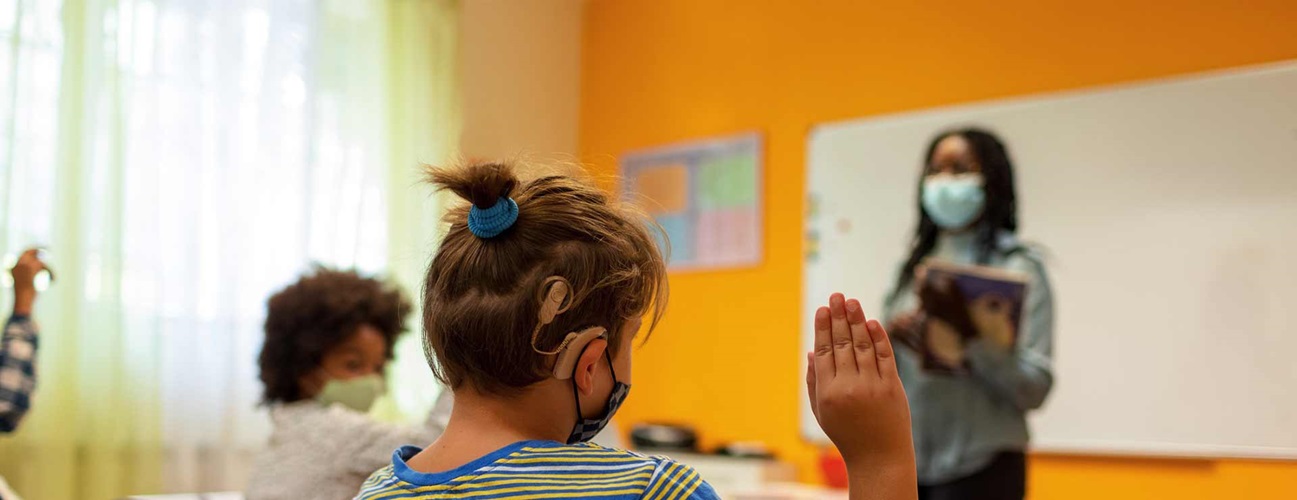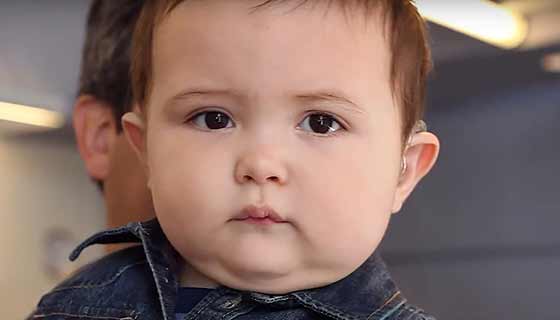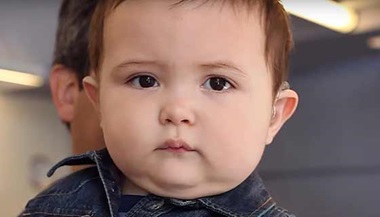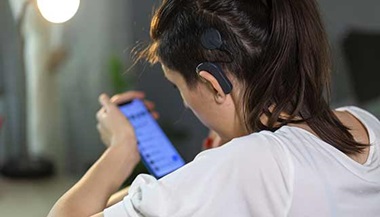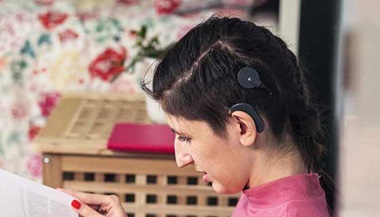Children's Cochlear Implants
Featured Expert:
Children learn to speak, read and write through listening. Hearing loss can affect these areas of development. When hearing aids don’t help enough, a surgically implanted hearing device called a cochlear implant may help children with severe hearing loss receive, process and interpret sounds.
What You Need to Know
- Children with severe hearing loss may be candidates for a cochlear implant when they are as young as 9 months of age.
- The earlier the cochlear implant is placed, the better the chance that the child will benefit from it.
- Cochlear implants are not made in different sizes for children and adults. A cochlear implant does not need to be removed as the child grows, unless there is a mechanical failure, which is rare.
Which children benefit the most from a cochlear implant?
A cochlear implant may be an option for a child with severe hearing loss that is not helped sufficiently by hearing aids, which amplify sound and send it through the damaged ear. A cochlear implant bypasses the damaged ear and directly stimulates the hearing nerve. The nerve sends the electronic signal to the brain, which interprets the signal.
Younger children who struggle with developing spoken language due to hearing loss can especially benefit from cochlear implants.
When should a child get a cochlear implant?
A child with confirmed severe hearing loss may receive a cochlear implant as young as 9 months of age.
Research from the National Institutes of Health suggests that the first three years of life are especially important regarding speech and language development. This is why, when a baby is diagnosed with a significant hearing loss, the family and care team should consider a cochlear implant.
The same is true for older children who have hearing loss. The sooner some sense of hearing is restored through a cochlear implant, the sooner they can resume interacting with their environment and learning with all their senses.
Cochlear Implantation in Children: Johns Hopkins Cochlear Implant Center
Cochlear Implant Surgery for Children
Placing a cochlear implant in a child’s ear is the same procedure as adult cochlear implant surgery.
While the child is asleep under general anesthesia:
- The surgeon makes a small incision behind the ear and, while carefully monitoring the facial nerves, makes an opening in a bone called the mastoid to reach the inner ear.
- The electrodes of the cochlear implant are placed in the cochlea.
- The receiver/stimulator is anchored to the skull under the skin.
- The surgery team closes the incision and the child is moved to recovery and observed for several hours before being released to go home.
Four weeks after surgery, the child returns to the doctor to get the external sound processor and to have the cochlear implant activated. The child will return for routine audiological visits for programming adjustments to optimize the ability to understand speech sounds.
The procedure is safe but does have some risks, such as numbness around the surgery site, ringing in the ears (tinnitus) and balance problems, which may be temporary or persistent.
Earaches and Meningitis in Children with Cochlear Implants
According to the U.S. Centers for Disease Control and Prevention, children with cochlear implants may be more vulnerable to certain types of bacterial meningitis, a dangerous infection.
Parents and caregivers should ensure the child gets meningitis shots and all other vaccines for infectious diseases as soon as the child is eligible. Older children receiving cochlear implants should be up to date on all their vaccines before surgery.
Ear infections are very common in children, and kids with cochlear implants can be treated with antibiotics. The child’s doctor may recommend placement of ear tubes to help prevent repeated infections. Ear tubes are also regarded as safe. Prompt treatment is essential, because a common earache can increase the risk of complications, including meningitis, for kids with cochlear implants.
If the child has ear pain, fever, reduced appetite or other signs of infection, the doctor should be contacted right away, and the child should be sure to complete the course of antibiotics.
What type of hearing improvement can a child expect after a cochlear implant?
Children receiving a cochlear implant can learn to hear and identify both loud and soft sounds, distinguish voices, and hear and appreciate music.
Several factors influence a child’s development of listening and spoken language with a cochlear implant:
- The age at the time of surgery (younger is better)
- Experience with hearing and language before surgery
- Frequency of use (the external equipment must be worn 100% of waking hours)
- Consistent rehabilitation therapy and a language-rich home environment
The Johns Hopkins Cochlear Implant Center
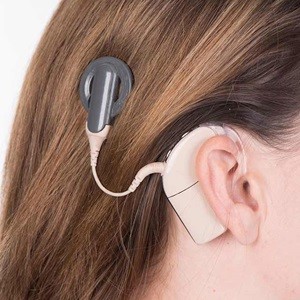
The Cochlear Implant Center offers a comprehensive approach to cochlear implantation and rehabilitation, including one-on-one therapy to help patients learn to use cochlear implants. We perform hundreds of cochlear implant surgeries each year on adults and children, lead clinical trials and provide state-of-the-art care.
Follow-up is essential for children’s cochlear implant success
Equally important to a good cochlear implant surgery is the care provided after surgery. Success requires a long-term commitment from the family and the child to learn the new way of listening through a cochlear implant.
The family should seek a comprehensive cochlear implant program that combines specialists in surgery, audiology and rehabilitation/listening therapy who collaborate with the child’s education professionals.
A child with a cochlear implant has ongoing needs to consult with the care team, including:
- Regular assessment and programming by the audiologist so that the cochlear implant can be adjusted to optimize the child’s progress
- Rehabilitation/listening therapy helps children reach their potential for using cochlear implants. This is particularly important for young children who are catching up in their development of listening and speaking skills. Cochlear implant rehabilitation/listening therapy focuses on teaching the child to identify and associate meaning with unfamiliar sounds. This help develop spoken language skills.
- Weekly family-centered listening therapy sessions with specialists in listening and spoken language teach parents and caregivers how to effectively communicate with the child at each stage of auditory development.
Listening therapy for children begins shortly after the implant is activated. A typical schedule is one hour per week.
Growing Up with a Cochlear Implant
Children with cochlear implants can enjoy most of the activities that make childhood fun and exciting. Waterproof cases allow the children to hear with the cochlear implant while swimming. Kids should wear high-quality helmets when bike riding or playing vigorous sports that have a risk of impact to the head.
Every person with a cochlear implant needs to take precautions related to:
- Head trauma
- Discharge of static electricity
- Meningitis
- Magnetic resonance imaging

